Tom King says that a lifetime of reading superhero comics helped him get ready to work for the CIA. And working for the CIA, in its own way, got him ready to write Batman.
In the last two years, Tom King has become a fan-favourite writer who seemingly came out of nowhere. After rising to the upper echelons of superhero comics scripting on the strength of his work on The Vision and Omega Men, he’s now one of the writers handling the Dark Knight’s monthly adventures. I spoke with King — along with Batman artist David Finch — last week on the phone to talk about his path to becoming a comics writer, a tour-de-force tenure on Omega Men and The Vision and where he thinks Batman is in his life now.
I want to begin by asking about your career path. How do you go from interning for Chris Claremont at Marvel to the CIA to novels and comics?
Tom King: I grew up your classic nerd who was not good at throwing balls or kicking them. I was good at reading stories by myself. That was my specialty as a child. I loved comics. I was an “every Wednesday” kind of a guy. I always wanted to be a comic book writer.
I went to university in New York. I interned at Vertigo and then I interned at Marvel working for Chris Claremont. Just to age myself, this was in 2000. I remember talking to Bob Harras, who was my boss at Marvel and is now my boss at DC, and he was like, “Comics will be dead in two years. This is it. The storm has run.”
So I didn’t get into the industry and wanted to become a lawyer, of all things. Then 9/11 happened. Like a billion of other people, I volunteered to do whatever I could, and I thought I would be good at CIA stuff because I was good with information, not at least because I had spent my life putting the continuity of comic books together. I thought, “Oh, that’s kind of similar.”
I went and became an Operations Officer, which is a guy who recruits people to penetrate terrorist networks overseas. I did that for six or seven years. I had a kid. I didn’t want to be in war zones anymore. I took a year off, became a house husband.
I wrote a novel at night, which was published by Simon & Schuster. That’s a long story. Then DC Comics got that and I got my first break I think three years ago.
Did you think that once you left the industry after your internships that you were done with comics as a potential career path?
King: Yeah. I remember leaving in the summer of 2000 and I had sold a story to Marvel Comics. I still have the check for $US300 ($400). It was a Black Knight story. I was super excited. I was ready to be the new Paul Levitz, Jim Shooter, another 13-year-old prodigy. (I was 21.) Then two weeks later Bob Harras and Chris Claremont, who had gotten me the gig, were fired. [laughs] And nobody was answering my emails.
Can you name some formative comic book writers for you? Anything in particular that made you think, “Hey, I can do this.”
King: Yeah, I think every comic nerd does this. I would collect origin stories just like I’m giving you my origin story. I would listen to podcasts and interviews with the guys. Because back then, there were such giants; Mark Millar, and Bendis, and Jason Aaron, and Hickman were just coming in, and I would listen to their origin stories and I would go, “Oh, I can’t do that, I can’t do that.” I would cross them off.
I was like, “Oh, Hickman’s a designer. Bendis drew his own comic books.” Then I got to Brad Meltzer and he was like, “Oh, I used to work in Washington DC and then I wrote a novel and then that novel got rejected and then picked up and then comic books found me.” I was like, “Here’s a path. I can follow that path!” So I literally followed what Brad Meltzer did and my God, it worked, which is interesting.
We’re here to talk about Batman, but I want to talk about Vision and Omega Men as well. If we’re being generous, they’re B- or C-list properties. Why did you choose them? I know every character is somebody’s favourite…
King: Omega Men has got to be down in the alphabet. I feel like it’s in the R- or S-range. Way down there. [laughs]
They approached me with Omega Men. It was the weekend Guardians of the Galaxy came out and I was like, “I get it.” I just wanted to write comics so I pitched them what I thought they wanted to hear. I pitched Guardians of the Galaxy. Exactly that.
I threw away the old main characters and brought in a new ragtag bunch of guys who were kind of silly and funny but really serious. They came back with, “Hey, you just pitched us Guardians of the Galaxy. Are you aware of that?” I was like, “Yeah. Isn’t that what you want? They said, “No. Do something crazy. Do something that relies on your CIA stuff.”
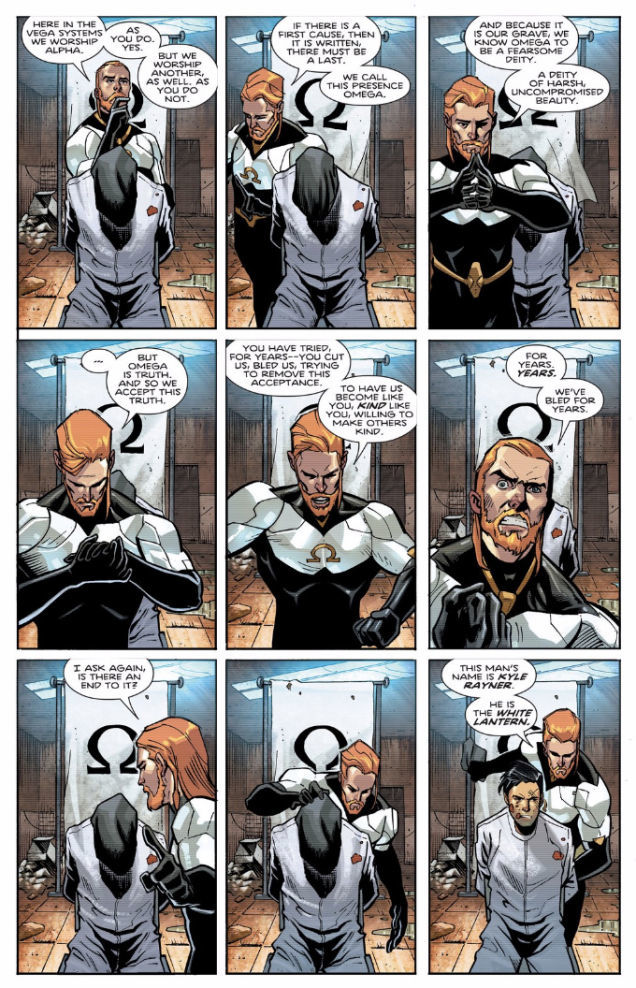
I said, “Why don’t we do terrorists in space.” They said, “We love it. Do that.” That’s how Omega Men started. I only knew the characters very vaguely almost solely through Alan Moore’s interpretation of them. He’d done a few short stories. I went back and looked at them and found that idea that these are terrorists working in a horrible colonial environment. There’s no good guys or bad guys.
The same thing happened with Vision where Marvel approached me. I was a Marvel zombie growing up. They threw a character at me. I was like whatever they say I’m going to say, “It’s my favourite character.” When they said Vision, I was like, “Yeah, that’s my favourite character.” It was nobody’s favourite character.
People always talk about continuity being this heavy millstone around the neck of comic book writers but you’ve used it very deftly, with the spectre of Krypton exploding in Omega Men to that Scarlet Witch issue of Vision. Can you talk about how you use it?
King: I love continuity. I was a continuity nerd growing up. I loved buying a comic in the middle of something and loved digging for back issues or going forward and trying to figure it all out. I love that stuff. When you write comic book characters — and I am totally guilty of this — it’s easy to write them as motivated by very simple things. Like, Batman’s parents died therefore he’s angry and wants to save the day. But, as human beings, we’re so much more complicated than that. We’re not motivated by one thing or another thing, there’s a thousand different influences on us. What makes continuity exciting, especially in Vision, is that it can stand in as a total metaphor for [those complications].
When I did that Scarlet Witch issue for Vision, I remembered how I was a huge West Coast Avengers fan as a kid. I knew that crazy history. I was like, “That history is so crazy. The only thing crazier is an actual relationship.” An actual relationship doesn’t just go straight ahead like we fall in love. It has these weird bumps and fights in it. Continuity is a perfect metaphor for all of that. So that’s how I approached it.
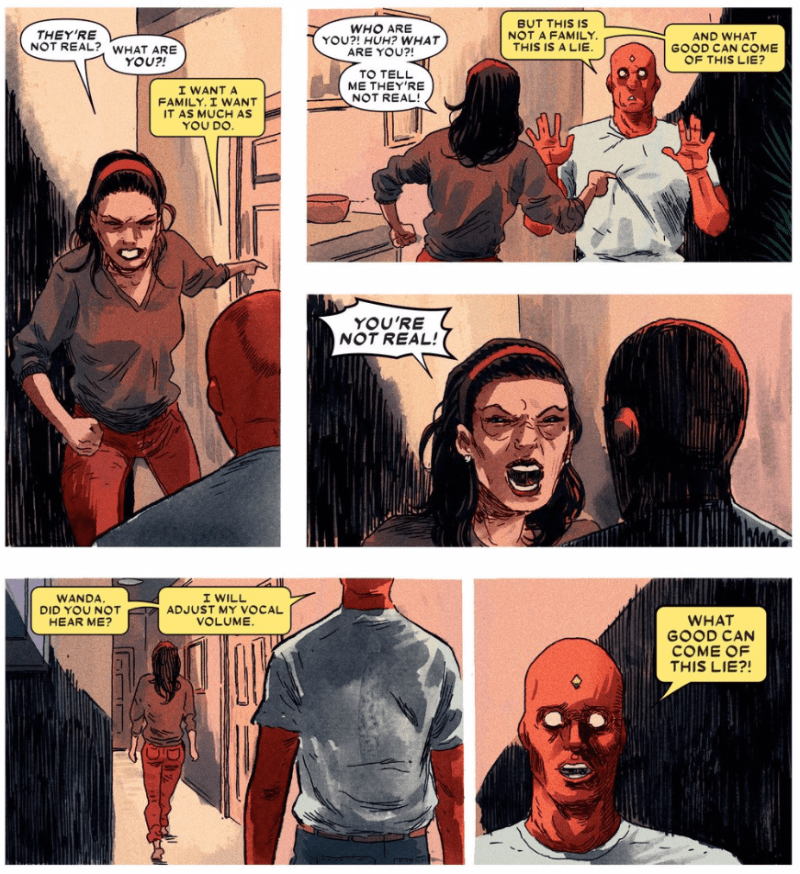
One of the things that’s a signature hallmark of Omega Men for me is the political allusions. But that wasn’t your original plan?
King: No. DC very much pushed for that. I don’t want to not give them credit. They wanted it to be a book that spoke to modern problems and to the world we live in. But of course, all comic books have to do that. Right? Like the first issue of Batman is about an act of terrorism. So it’s the only way you can write. If you want terrorists to scare people, and if you want to get into people’s hearts, you have to talk about what they’re experiencing in their daily lives.
It seems like it’s going to be impossible for other writers to extract them from the situation you put them in, especially with Kyle Rayner in Omega Men. I know Vision is not done yet but is that a way of making these shared universe characters feel like that they belong to just you?
King: [laughs] Yes! They’re all mine. MINE! No.
Whoever uses Kyle in the iteration of the Green Lantern mythos that evolves after this is going to have to either ignore or awkwardly acknowledge the events of Omega Men…
King: I feel that part of comic books is the letting-go of that stuff. I view Omega Men as a complete novel. It has a beginning, a middle and an end. People need to take from it and run with it and I hope they do. But I don’t know. The only permanent damage on Kyle is a small scar on his neck. He’s still on the table. He’s gone through something. He’s had some revelations.
But these are comics. We live in the second act of stories. People are going to continue to have revelations and then move forward. As for Vision, how Vision ends, that could go any sort of way. I was on the phone with Marvel editorial walking it through and it gets crazy at the end. I don’t know what they’re going to do next.
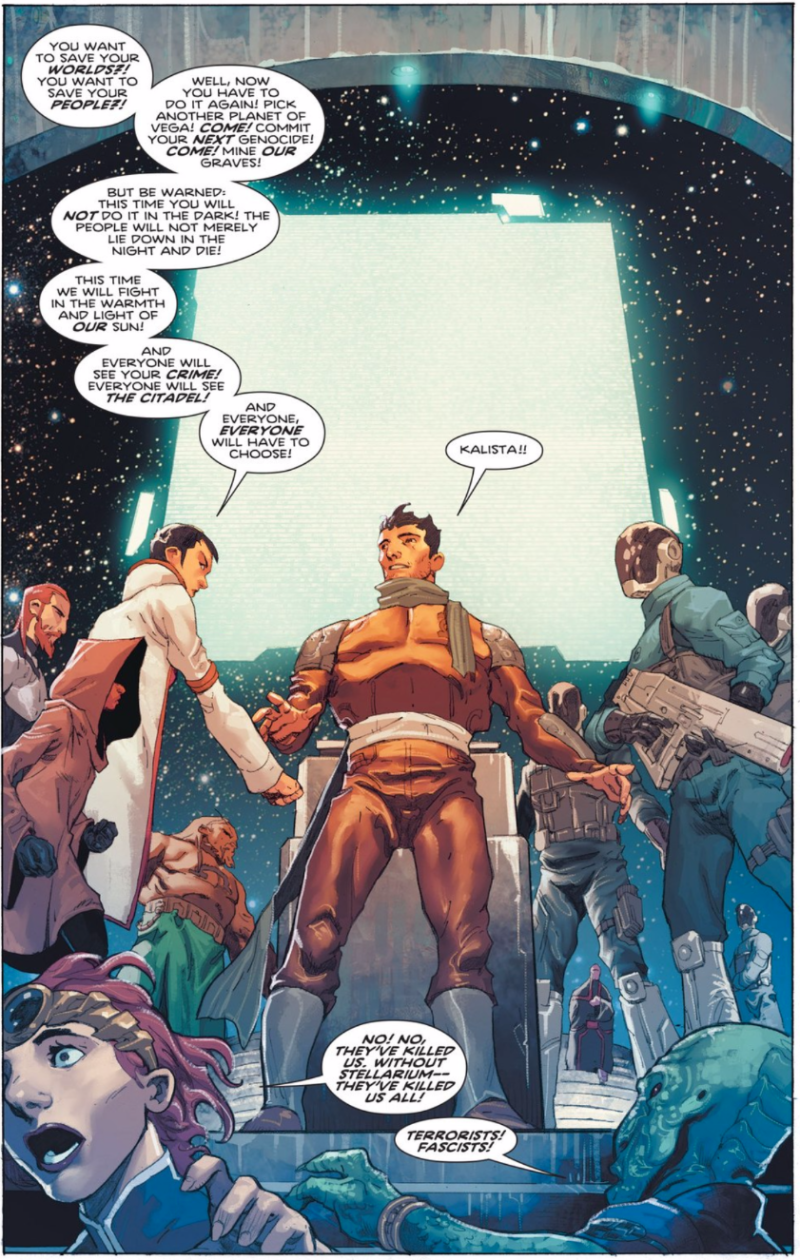
What are your working relationships with your artists? How much of that determines the shape of your stories?
King: Every comic book writer will tell you it’s totally different with every single artist you work with. It depends on how you click with them and how your scripts are and stuff. I consider this a trilogy of books, Sheriff, Omega Men and Vision. Barnaby and I very rarely talked. He’s faraway. He has an agent. So that’s totally different.
Whereas with Sheriff, I’m with Mitch Gerads, who is like my brother, so we talk all the time. Then, somewhere in-between is Gabriel Walta who’s in Spain and draws Vision. So it runs an entire spectrum.
Your Batman seems to be more of a straight-ahead superhero than anything you’ve done so far.
King: Yeah. Hopefully that’s the way it comes across, too, because that is the utter intention. Again, I wrote these three books and they’re kind of — in their nicest way possible — navel-gazing books. They are books with deep, dark themes. There’s no good guys or bad guys. They’re thrilling and horrific but they’re meant to evoke certain emotions.
With Batman, I really wanted to write a superhero action movie. There will be deep scenes. I can’t get that stuff out of my head. But my real intention is to thrill the reader. To take them out of their everyday and be like, “Holy shit, I can’t believe that just happened.”
David, you’ve written and drawn the character for a while now. What’s different about your approach this time out?
David Finch: I think my approach changes whenever I work with a different writer. Tom wrote a very action-oriented script and it’s really in my wheelhouse. But he really pushed me very, very hard in directions that I hadn’t really gone just yet. He wrote scenes that are completely bananas. It’s craziness, some of the stuff that happens in there. Just trying to find a way to make it work and figure it out on the page was a big challenge. That’s really what keeps the job fun.
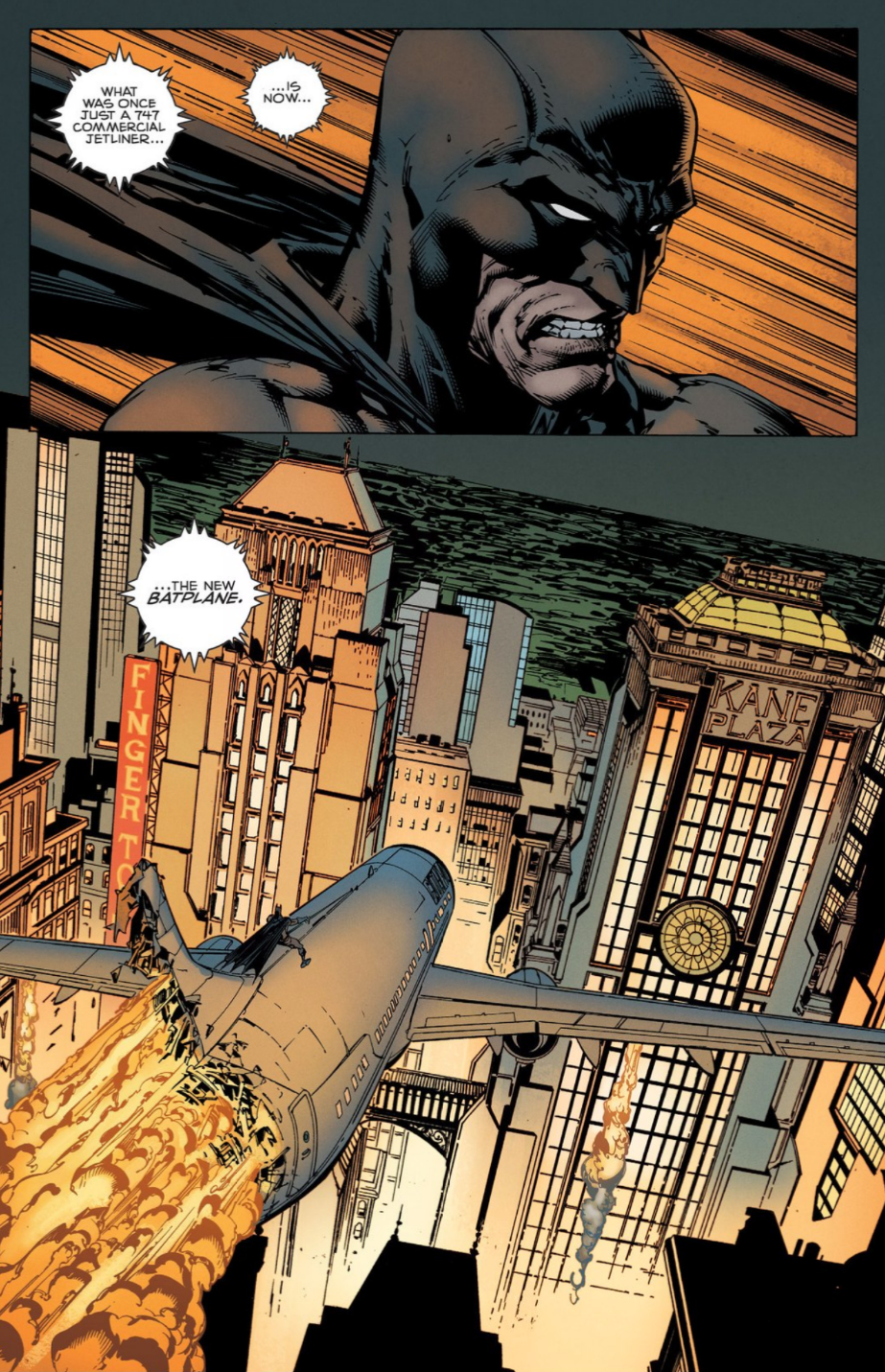
Whenever I start something, I always have all of the artists that have done the character before in my head. I imagine it’s going to be like Tim Sale and how he does this or Mike Mignola, and once I actually start drawing, all of that stuff goes out the window, and it’s just my artwork. You get confronted with your own limitations and it’s tough. But I don’t know if I had a point. Sorry.
King: That’s good to know. Writers say the same thing. You can’t escape yourself. Like, “I’m going to do this and this, and you’re like, “Oh no, it’s just me writing again.”
What were your cues for designing the new characters Gotham and Gotham Girl, David? He has a Superman-esque shield on his chest, and he’s very Silver Age. He doesn’t look like a character that you wouldn’t normally draw. How do you make him fit into your version of Gotham?
Finch: He’s a saviour character. They both are. Having a similar shape to the Superman symbol, for the outside shape of it, I feel like it really gets across right away the kind of characters and the kind of strength that you’re dealing with and what they represent. So it seemed like an obvious choice.
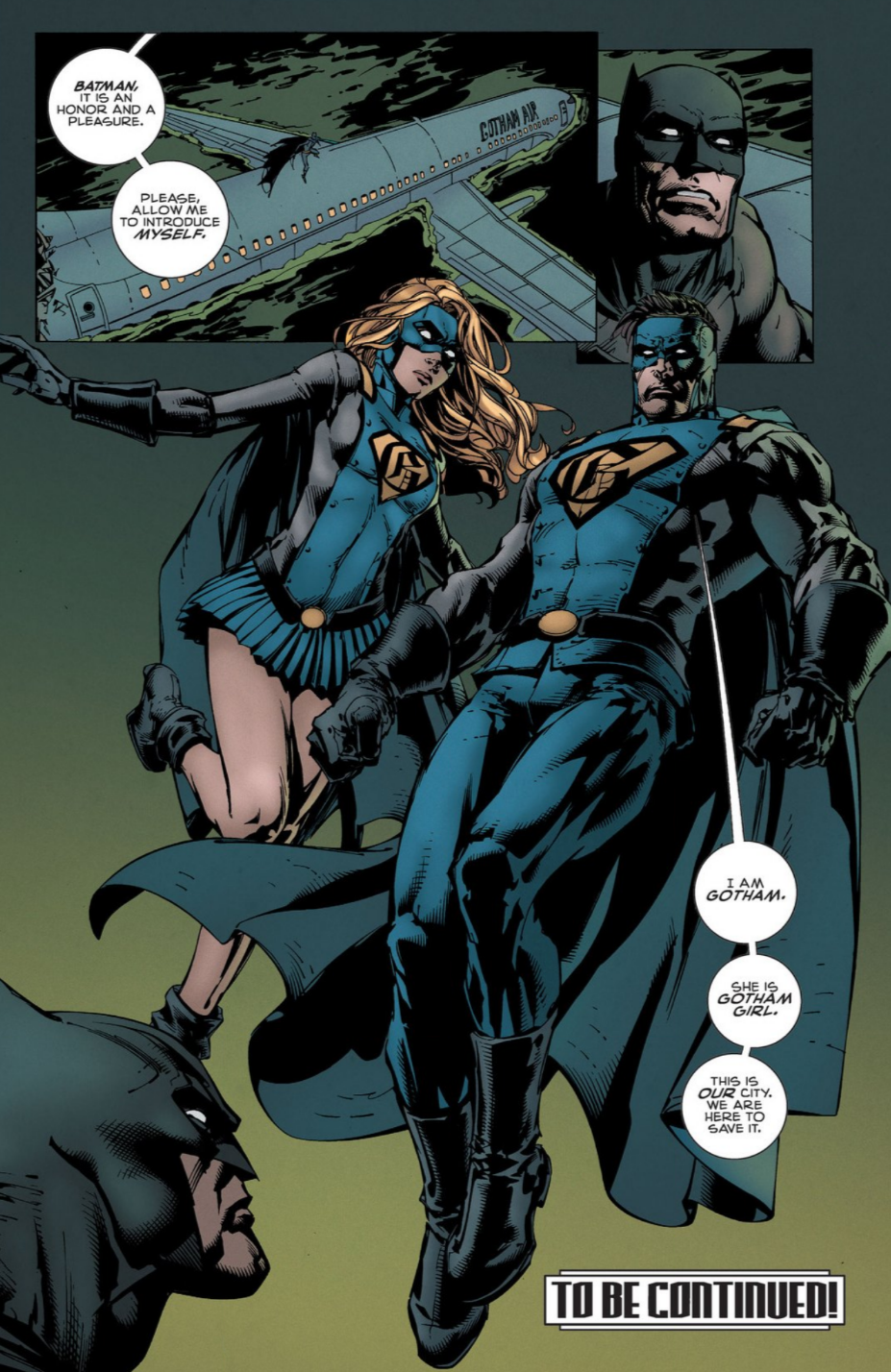
They’re characters that could not exist anywhere else but Gotham City and that’s really what they’re all about. I wanted that to be as clear as possible. Actually, I initially had a really odd colour choice that fortunately nobody liked right out of the gate.
What was it?
Finch: I wanted to do an ugly clinical green with grey. I don’t know why I thought that would work but it really didn’t. I tried it and it didn’t work at all. Tom wanted to do something that was more in keeping with the Batman colour scheme and that worked perfectly, so I’m glad we went in that direction.
I was saying earlier too, I didn’t put a huge amount of thought actually into the designs because I think Tom had them so worked up on the page, that they felt very real for me, all of the characters in the story really do. Sometimes it just flows. I felt like I really knew who they were. It just worked for me pretty easily.
Tom, you’ve talked before in interviews where Batman is always being sad and that’s a long-established trope about the character.
King: [laughs] Always sad. I bet the LEGO Movie killed that trope. You just hear that music in the background.
You’re inheriting a Batman who is kind of a clean slate, but it also feels like Bruce is showing more emotional range in your first two issues. What’s your take on Batman’s relationships? What does it look like when Batman lets people in?
King: I think at this point in his career — and this goes back to the continuity stuff — it’s stupid to write a story where Batman’s like, “I don’t need a family. I just need to go forward and think about my dead parents.” He’s smart enough to realise that he’s been through some things and that he does need a family and that he does need help.
There’s a part in Batman: Rebirth where he says to Duke, “I’m trying something new.” He’s not saying what it is because full emotional transparency is not necessarily the norm for Batman. He’s like, “I’m just going to have somebody hang around and not be connected to me in a tortured way…”
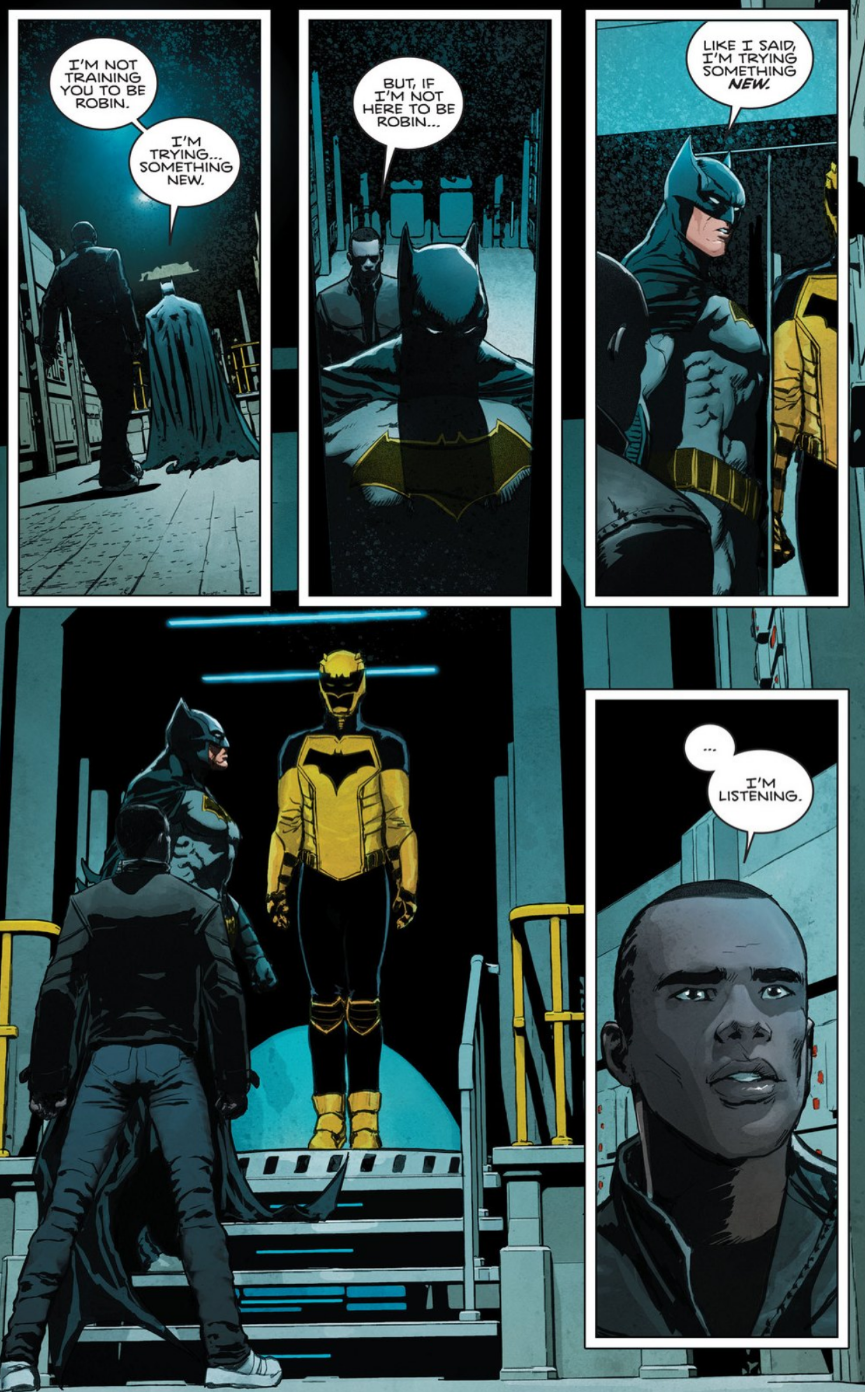
King: I think that’s all right. He’s not quippy. He’s not the kind of guy who is going to sit down and talk for a long time. He’s focused. He wants to get shit done. That’s who Batman is. He took that vow. He’s going to meet that vow.
Whatever tools he needs to do it, whether it’s having a family, having Duke in the cave, interacting with these two new superheroes, he’s going to use those tools. His own life is a tool to him. He’s willing to die for that. He’s going to accomplish that goal.
To me, Batman is almost like an existential character. What if he sacrificed everything single thing to achieve one thing? What would that mean to you and what would that mean to your psyche?
Are you coordinating with James Tynion IV at all about the stuff he’s doing in Detective Comics? Do you guys check in?
King: Yeah, I was on the phone with Scott and James two hours ago. We’re all on the very same page. I love his take on stuff.
How involved are your scripts? Omega Men was very regimented in its presentation, where some of your other stuff felt looser.
King: Omega Men was a special case because I was doing the layouts on that comic. Nothing has been as crazy as that except a few issues of Grayson. I feel like from the scripts I read… David can tell you better than I can. I don’t want to hear the answer but he can tell you. I feel like I’m a little tighter than most people. I say what’s in each panel. Sometimes I put the angle in the panel. I have all of the dialogue mapped out. I see a lot of people say draw a fight scene here and I’ll dialogue it later.
I have to see the comic in my head to write it. But, then as David does and as Mikel does, I always write my scripts like, “Hey, if you can do this better, do it.” Often David does. Then I’m like, “Oh yeah, that’s the way it should have been done.” I then adjust the dialogue as needed.
Grayson just ended, but you and Tim Seeley left the book before the final arc. How different was the end from the direction that you and Tim were planning not to go?
King: We met with the guys and told them what we thought it could be. We helped them plot it out. It wasn’t that different. To be perfectly honest — maybe I shouldn’t admit this — I didn’t read the last few issues. It’s like looking at your kids with different parents. It’s hard to look at.
I read a Washington Post interview where you talked about making a difference as a CIA counter-terrorism agent. From the outside looking in, it seems like that kind of work might be futile. Are there ways you can quantify the changes you made in people’s lives through that kind of work? That isn’t classified?
King: I can’t quantify. I can’t talk about specific things. Sometimes I understand how Bruce Wayne feels. When you take down a terrorist or something there’s always six guys to take their place. Everyone is Hydra. But you still have to do it. It seems silly to put it in a comic book context but Batman doesn’t go out and say, “OK, if I fight 10 criminals, there’s going to be 10 more criminals tomorrow, so I shouldn’t fight 10 criminals today.” That’s a stupid attitude to have. He goes out and does the best he can. Occasionally in this world, there are some unique figures. There are some Hitlers, there are some Stalins, there are some bin Ladens. Going after those guys and taking away their weapons actually does advance the cause a little bit even if it just delays them for a little while.
The Sheriff of Babylon obviously hits closest to your CIA work experience. The thing I find most intriguing about it is that it’s built around a femme fatale in a culture where feminism isn’t terribly prevalent, at least from the Western perspective. How did you hit upon that to be one of the axis you wanted the story to rotate around?
King: This isn’t going to be a revelation to any people who spend time in the Middle East but there are incredibly strong women who work within that system who are both dedicated to the Islamic ideals that we see as oppressing but also find ways to turn them into strengths.
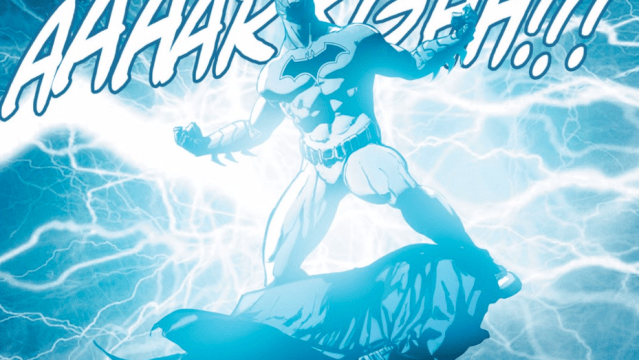
Comments